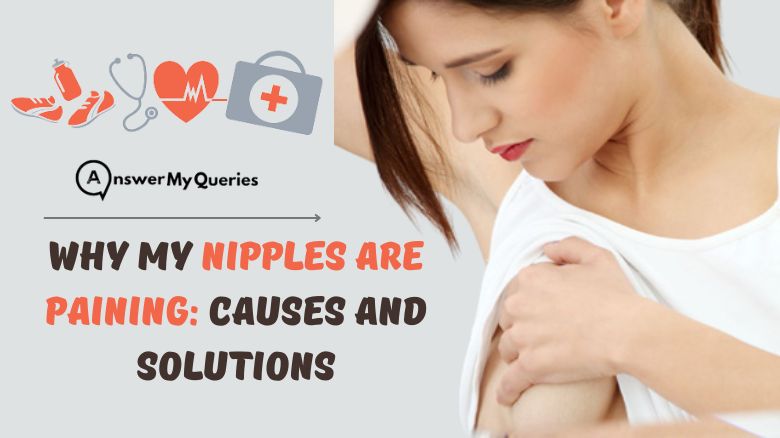
The Mystery Unveiled: Why Are My Nipples Sore?
Why Are My Nipples Sore? Nipple pain is a common but often distressing issue that many individuals, both men, and women, experience at some point in their lives. It can range from mild discomfort to intense pain. Understanding the causes of Why My Nipples Are Paining? is the first step in finding relief. This comprehensive guide will explore the various factors that can lead to nipple pain and provide you with valuable insights into managing and preventing it.
Anatomy of the Nipple
To comprehend why nipple pain occurs or why my nipples are paining, let’s first delve into the complex anatomy of this sensitive area. The nipple is not just a tiny protrusion; it’s a highly intricate structure comprised of numerous nerve endings, milk ducts, and a network of blood vessels. This rich innervation makes the nipple incredibly sensitive, and any disturbances can trigger discomfort or pain.

Common Causes of Why Are My Nipples Sore?
Why Are My Nipples Sore it often stems from hormonal fluctuations, pregnancy, breastfeeding challenges, friction, infections, allergies, and, rarely, serious conditions like breast cancer. Understanding the cause is crucial for relief.
1. Hormonal Changes
One of the most common reasons for nipple pain is hormonal fluctuations. These changes can occur during various life stages and affect individuals differently. For instance, hormonal shifts during menstruation can cause breast tenderness and sore nipples. This tenderness usually occurs just before menstruation begins, primarily due to the effects of estrogen and progesterone on breast tissue, leading to swelling and sensitivity.
Hormonal changes are not exclusive to menstruation; they can also result from menopause or puberty, triggering side effects like nipple pain. Additionally, hormonal birth control methods can influence nipple sensitivity.
2. Friction and Irritation
Friction and irritation are notorious culprits when it comes to nipple discomfort. Tight-fitting clothing, especially bras or sports bras without adequate support, can lead to constant rubbing against the nipples. Over time, this can result in soreness, chafing, and even pain. Athletes who engage in high-intensity sports are particularly prone to this type of nipple discomfort.
3. Infections
Nipple pain can also be a consequence of infections. Bacterial and fungal infections can take root in moist and sensitive breast tissue, leading to redness, swelling, and significant pain. It’s important to note that infections in the nipple area should be promptly addressed to prevent them from worsening.
4. Breastfeeding Issues
Nipple pain related to breastfeeding is a common concern for new mothers. Most cases of nipple pain during breastfeeding result from a poor latch, where the baby does not adequately encompass both the nipple and areola in their mouth. Instead, they may latch onto only the nipple, leading to excruciating pain. While this pain often resolves within the first month of breastfeeding, persistent discomfort should prompt consultation with a healthcare provider.
For those pumping breast milk, using an ill-fitting breast shield (also known as a breast pump flange) can lead to nipple pain. These shields, which fit over the areola and nipple, can worsen discomfort if not properly sized. Seeking guidance from a healthcare provider or a lactation consultant can help address this issue effectively.
5. Trauma
Nipple trauma can result from activities such as sexual encounters or nipple piercings, leading to pain and irritation. If you have nipple piercings, it’s crucial to monitor for signs of infection, such as swelling or pus-like discharge. In cases where nipple soreness is attributed to rough foreplay, the discomfort should improve over time.
6. Disease or Cancer
While nipple pain is typically benign, it can be caused by underlying medical conditions, including cancer. Paget’s disease of the breast or breast cancer can manifest as nipple pain. In addition to pain or itching, individuals may experience nipple discharge, changes in breast shape, or the inversion of the nipple. Although nipple pain as a result of cancer is rare, it’s crucial to consult a healthcare provider if any of these symptoms occur.
Why My Nipples Are Paining? Check Some Serious Causes of Nipple Pain
- Mastitis: Mastitis is a painful inflammation of the breast tissue, typically caused by a bacterial infection. It’s more common in breastfeeding women, but it can affect anyone. Symptoms include intense breast pain, redness, swelling, and sometimes even flu-like symptoms such as fever and chills. Mastitis requires prompt medical attention and treatment with antibiotics.
- Paget’s Disease: Although relatively rare, Paget’s disease is a serious condition that can initially manifest as nipple pain. It’s a form of breast cancer that primarily affects the nipple and the areola. Early detection and intervention are crucial for effectively managing this condition. According to the American Cancer Society, Paget’s disease accounts for about 1% of all breast cancers.
- Breast Cancer: While nipple pain is rarely the sole indicator of breast cancer, it can be one of the warning signs. Other accompanying symptoms may include changes in the breast’s size, shape, or appearance, as well as unusual discharge from the nipple. It’s vital to remember that breast cancer is a complex disease, and early detection greatly improves the chances of successful treatment.
Diagnosis and Seeking Medical Advice
Still thinking Why My Nipples Are Paining? Well if you experience persistent or severe nipple pain, or if you notice any concerning symptoms such as lumps, changes in breast shape, or nipple discharge, it’s imperative to consult a healthcare provider. Early diagnosis is key to addressing potential underlying issues. Diagnostic methods may include mammograms, breast ultrasounds, or even biopsies, depending on the clinical evaluation.
Home Remedies for Nipple Pain
- Warm Compress: A simple and effective home remedy for nipple pain is applying a warm compress to the affected area. The heat helps to increase blood flow, reduce inflammation, and alleviate discomfort. You can do this by soaking a clean cloth in warm water and gently placing it on your nipples for 10-15 minutes, several times a day.
- Proper Bra Support: Preventing nipple pain caused by friction and irritation often starts with choosing the right bra. Opt for well-fitting, supportive bras that reduce the risk of chafing. Sports bras with padded layers can be particularly helpful for athletes and active individuals.
- Nipple Creams: Nipple creams, designed specifically for breastfeeding mothers, can be a lifesaver. They provide a protective barrier on the nipples, soothing soreness and preventing further irritation. These creams are available over-the-counter and are safe for both nursing and non-nursing individuals.
Some Effective Prevention Tips
Preventing nipple pain involves making some lifestyle adjustments and adopting healthy habits can solve your problem of why my nipples are paining. Check the following suggested prevention tips:
- Wear Comfortable Clothing: Choose breathable, soft fabrics that reduce friction against the nipples.
- Proper Breast Hygiene: Maintain good breast hygiene to prevent infections. Clean the nipple area gently with mild soap and water.
- Correct Breastfeeding Techniques: If you’re a breastfeeding mother, seek assistance to ensure a proper latch, which can significantly reduce nipple pain.
- Stress Management: High stress levels can exacerbate nipple pain. Practice relaxation techniques like deep breathing and meditation to keep stress in check.
When to See a Doctor
Know you already know all the causes of Why My Nipples Are Paining. Knowing when to seek medical advice is essential. If your nipple pain persists, worsens, or is accompanied by concerning symptoms such as lumps, changes in breast appearance, or nipple discharge, do not hesitate to consult a healthcare professional. Timely intervention can make a significant difference in addressing potential underlying issues.
Conclusion: Why My Nipples Are Paining
Why My Nipples Are Paining well nipple pain is a multifaceted issue that can range from temporary discomfort to a sign of a more serious health condition. Understanding the causes, as well as prevention and management strategies, is vital for your overall well-being. Remember, early detection and medical consultation are essential if you experience persistent or severe nipple pain, as they can lead to timely intervention and improved outcomes.
You can also read our related health articles like menstrual problems, dental implant costs, and mental health benefits to take care of your overall health.
Frequently Asked Questions
Absolutely. Hormonal fluctuations, such as those during puberty and menstruation, can lead to nipple tenderness and pain. It’s a common occurrence among women.
Paget’s disease accounts for approximately 1% of all breast cancers, according to the American Cancer Society. While rare, it’s essential to be aware of its potential significance.
No, nipple pain is rarely the only symptom of breast cancer. However, it can be one of the warning signs, especially when accompanied by other concerning symptoms. Early evaluation is crucial.
Yes, nipple pain can affect both men and women. While some causes may be specific to one gender, others, such as infections or hormonal changes, can affect individuals of any gender.
Risk factors for mastitis include breastfeeding, cracked nipples, a history of mastitis, and conditions that weaken the immune system. It’s essential to seek prompt treatment if you suspect mastitis to prevent complications.





